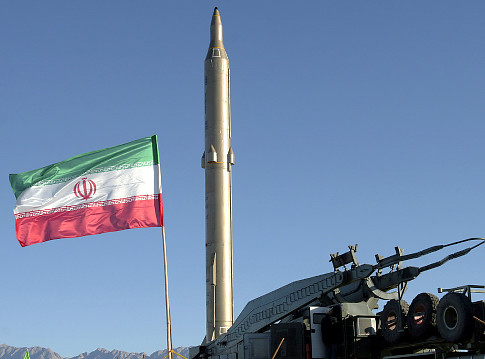
Israel says Iran can launch 4 nukes with the current uranium reserve, all of them capable of reaching US.
Tel Aviv / NationalTurk – Israel’s military intelligence chief has announced that Iranian scientists have already managed to enrich enough radioactive material to successfully produce four nuclear bombs ready to be launched and can reach US soil.
Israeli General Aviv Kochavi broke the news at a security conference. The intelligence believes Iran nuclear program is a year short of producing a crude device and two of manufacturing a nuclear warhead attached on a ballistic missile.
Israel on Iran Nukes : The pot calling the kettle black
Not sharing the nuclear arsenal Israel already has at its immediate disposal, the Israeli Deputy PM also claimed Aviv Kochavi claims confidently : “Iran is very actively pursuing its efforts to enhance its nuclear capacities, and we have evidence that they are seeking nuclear weapons.” However, no actual evidence was demonstrated or even referred to at the press conference.
Israel : Iran can hit USA with nukes with new missiles
The Israeli Deputy PM also claimes that Iran has also succeeded in building a new model long-range missile capable of putting the USA within its reach. Moshe Ya’alon, who had just returned from Washington where he discussed the Iran conflict with President Obama’s administration, chose to echo Kochavi’s words of warning, saying “The Israeli government will stop Iran one way or another.”
These latest statements are very much in line with the position of Israel and its allies who are accusing Iran of using its nuclear industry to mask plans to develop nuclear arms, a charge Tehran government officially has frequently and vehemently denied.
Attack on Iran : When ?
Israel, backed by its key ally the United States, has long pushed for tougher sanctions against Iran. Top level officials in both Tel Aviv and Washington DC have recently said they do not rule out a military attack against the Islamic Republic.
As sparks continue to fly around the powder keg of Iran’s supposed nuclear ambitions, the Middle Eastern state is not playing dead either. A defiant President Mahmoud Ahmadinejad announced on Thursday that the country is planning to double its military spending over the next year; a sign that is being interpreted by many as “taking a stand” against pressure from the West.
The United States and their NATO allies are also flexing their muscles, with recent transfers of US fighter jets and other military planes to the region. Troops have also been reportedly arriving at various American military bases in the Persian Gulf, with another ten thousand soldiers recently transferred to Israel – allegedly to test the US anti-ballistic missile defense system.
Persian Gulf : Waters heating, war drums beating
On top of that, two additional US Navy aircraft carriers – the USS Abraham Lincoln and Carl Vinson – are on patrol in the Persian Gulf and are expected to be joined by the USS Enterprise in March. The USS Annapolis, a nuclear submarine, was earlier reported to have entered the Red Sea and is rumored to be heading towards the Persian Gulf through Hurmuz Strait as well.
Together with the US military bases already established in the region – for example, the 5th Fleet, stationed in Bahrain – all of this is interpreted by many pundits as nothing shy of intimidation, and some experts believe the US is trying to provoke Iran into making the first move, which Us and Israel are waiting for.
Error, group does not exist! Check your syntax! (ID: 15)



Iran needs to back off or die. America dares iran to test their long range missles at the U.S. or iran will face the price by tomarrow with the U.S.
Though Europe and the United States are accelerating economic sanctions in an effort to appease Israel, it plans to attack Iran anyway. One might start to wonder which of these two is now the more rogue state in the Middle East.
Should Israel surgically attack Iran, as it had done Iraq twenty years ago, we can expect Iran to return fire. And Iran might have unknown weapons in its arsenal and unknown ways to use them.
The question then becomes to what extent do we help Israel when it picks a fight with Iran?
If the U.S. helps it unconditionally, as it had done before, then we risk retaliation from Iran on our nearby facilities. The same is true for european countries which are all within a striking distance of Iran.
So what do we do, sit back and not help a friend trying to make the world a safer place for the rest of us?
In this case, perhaps.
If Israel wants to bomb Iran on its own terms, when it wants to and how it wants to, then it can also stand ready to fend for itself when Iran returns fire. To let it assume otherwise is irresponsible since it encourages rogue action on the expectation of help. With the world on the mend from a profound economic downturn, such foreseeable misstep should be avoided.
Does this mean then that we should resign ourselves to a nuclear Iran? George W. Bush may have thought so, as he may have thought the same about a nuclear North Korea. And despite his and Dick Cheney’s professed love for Israel, they might have been looking for new friend in the Middle East when they toppled Saddam. Iraq did not prove a friend, but it has proved that U.N. inspections can work because the UN teams had destroyed all of its weapons of mass destruction.
Who knows, in time our economic sanctions might also slow down Iran. If not, having nuclear Iran — or nuclear anyone else — is something the rest of us can learn to live with.
Maybe Israel should too. And conduct itself accordingly.